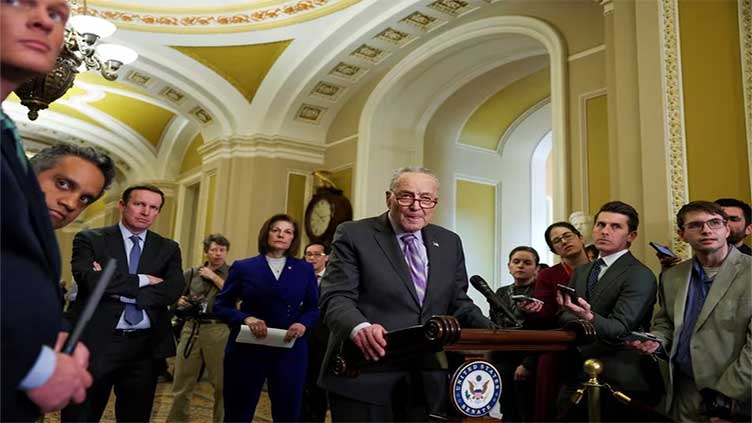Bipartisan border, Ukraine deal looks set to fail in US Senate

World
Bipartisan border, Ukraine deal looks set to fail in US Senate
WASHINGTON (Reuters) – A bipartisan $118 billion US Senate bill to tighten border security and provide aid to allies Ukraine and Israel appeared headed to the scrap heap on Wednesday, after Republicans egged on by Donald Trump turned against the idea.
The measure was the product of months of negotiation led by senators Chris Murphy, a Democrat, James Lankford, a Republican and Kyrsten Sinema, an independent. If passed, it would have represented the biggest shift in US immigration policy in decades.
Talks intensified in the fall after Democratic President Joe Biden asked Congress for $60 billion in aid for Ukraine as it fights off a Russian invasion and $14 billion for Israel in its war with Hamas. Congressional Republicans said they would agree to such spending only if it was coupled with a plan to address the massive numbers of migrants arriving at the border.
As negotiators closed in on a deal, Donald Trump, the frontrunner for the Republican nomination to challenge Biden, turned on the deal and Republican House of Representatives Speaker Mike Johnson used his first major floor speech to blast the then-unreleased deal as inadequate.
"When President Trump came along and said he didn't want to solve the border problem, that he wanted it as a campaign issue, Speaker Johnson obediently changed his tune," Democratic Senate Majority Leader Chuck Schumer told reporters on Tuesday.
Johnson has denied that his opposition to the bill is political, instead calling inadequate a measure that would order the Department of Homeland Security to temporarily shut the border to most migrants if more than 5,000 people try to enter per day and end the controversial "catch and release" practice.
Top Senate Republican Mitch McConnell, who had long advocated the deal as a means of securing aid for Ukraine, by Tuesday said it had no chance of passage in the face of growing opposition in his party.
"It looks to me, and to most of our members, as if we have no real chance here to make a law," McConnell said, after Johnson had already proclaimed the legislation "dead on arrival" in his chamber.
Instead, the House on Tuesday tried and failed to impeach Biden's top border official, Homeland Security Secretary Alejandro Mayorkas, charges that four House Republicans voted against. The measure failed in a 214-216 vote.
'WE WILL HAVE A VOTE'
Despite the opposition, Schumer on Tuesday vowed, "We will have a vote tomorrow" on a procedural matter to try to advance the bill before the full Senate for consideration.
If the border bill fails as expected, Schumer plans to hold another vote Wednesday on a bill that would provide aid for Ukraine, Israel and other allies without the border provisions, an aide said. It was not clear that bill would succeed either.
With suspense over the fate of the legislation dissipating, Republicans went back to attacking Biden's immigration policies and ignoring the bill that was embraced by conservative organizations including the Wall Street Journal editorial board, the US Chamber of Commerce and the National Border Patrol Council, the labor union that represents about 18,000 US Border Patrol agents.
This was not the first time Republicans sank an arduous, bipartisan effort to reform outdated US immigration law. In mid-2013, the Senate overwhelmingly passed a bipartisan, comprehensive bill only to see the Republican-controlled House of Representatives say it was dead on arrival. A subsequent effort in early 2014 by then-Speaker John Boehner to promote "principles" for writing immigration legislation was stopped by right-wing Republicans.
At the time, they said no such legislation should be considered with mid-term elections scheduled for that November.
This time around, Senator John Barrasso, the number-three Republican, announced his opposition to this latest effort, saying, "Americans will turn to the upcoming election to end the border crisis."


